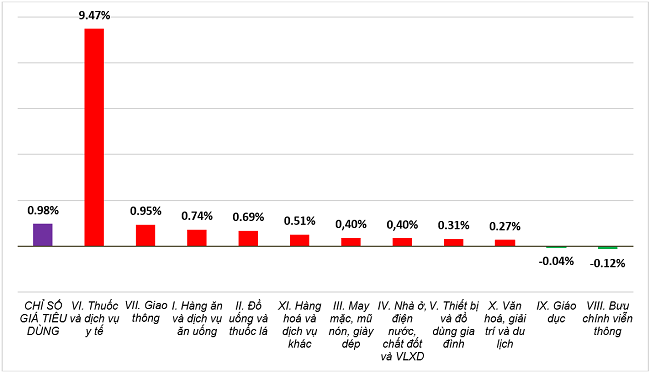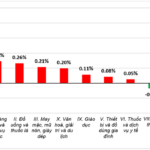The General Statistics Office’s report on January 6, 2025, revealed a 0.98% month-over-month rise in the consumer price index (CPI) for January 2025. In comparison to January 2024, the CPI rose by 3.63% year-over-year.
The CPI increase in January was attributed to healthcare service fee adjustments implemented by several localities in accordance with Circular No. 21/2024/TT-BYT, as well as rising transportation and food prices due to increased travel and shopping demands during the Tet holiday.
Of the 0.98% CPI increase in January 2025 compared to the previous month, nine groups of goods and services witnessed price hikes, while two groups experienced price declines.
The group of medicines and healthcare services witnessed the highest increase of 9.47% compared to the previous month, contributing to a 0.51 percentage point rise in the overall CPI. This was largely due to the implementation of new healthcare service fees based on Circular No. 21/2024/TT-BYT, issued on October 17, 2024, by the Ministry of Health, which outlines the pricing methods for medical examination and treatment services.
Additionally, with the arrival of winter and significant temperature variations between day and night, cases of flu and respiratory illnesses increased, leading to a surge in demand for painkillers, fever reducers, respiratory medications, vitamins, and minerals. Specifically, prices for vitamin and mineral supplements rose by 0.34%, digestive system drugs increased by 0.16%, and respiratory drugs witnessed a 0.12% price hike.

The transportation group followed with a 0.95% increase, contributing to a 0.09 percentage point rise in the overall CPI. Increased holiday travel demands led to an 11.08% surge in air passenger transport prices, while road and waterway passenger transport rates both climbed by 1.73%. Passenger transport by railway witnessed a 1.71% increase, and bus transport rates rose by 0.24%. Gasoline prices rose by 2.02%, and diesel prices increased by 4.99% due to domestic price adjustments. Car spare parts prices increased by 0.66%, motorcycle tires and tubes rose by 0.28%, and other motorcycle parts saw a 0.4% price hike…
The group of food and catering services experienced a 0.74% increase, impacting the overall CPI by 0.25 percentage points. Within this group, cereals rose by 0.3%, and food prices increased by 0.97%, contributing 0.21 percentage points to the overall CPI rise. Dining out became 0.33% more expensive.
Additionally, the group of beverages and tobacco products witnessed a 0.69% increase due to heightened consumption and their popularity as holiday gifts. Alcoholic beverage prices rose by 0.8%, tobacco prices increased by 0.7%, and non-alcoholic beverage prices climbed by 0.36%.
The group of other goods and services saw a 0.51% price hike, mainly driven by increases in certain items: Haircut and hair washing services rose by 1.91%; jewelry prices increased by 0.95%; wedding-related services climbed by 0.56%; worship items became 0.42% more expensive; wristwatch prices rose by 0.3%; and personal care services witnessed a 0.11% increase…
With the Tet holiday approaching, the group of culture, entertainment, and tourism witnessed a 0.27% increase, mainly driven by higher prices for flowers, ornamental plants, and landscapes, which rose by 1.59% due to increased demand during the Tet holiday. Package tours became 0.64% more expensive (with domestic and international tours increasing by 0.52% and 0.99%, respectively) due to higher travel demands and service costs. Hotels and guesthouses saw a 0.43% price increase, and books, newspapers, and magazines became 0.12% more expensive.
According to data from the General Statistics Office, core inflation in January 2025 rose by 0.42% compared to the previous month and by 3.07% year-over-year.
“Core inflation rose by 3.07% year-over-year, slightly lower than the average CPI increase (3.63%), mainly due to the impact of food, electricity, and healthcare service prices, which are excluded from the core inflation calculation,” explained the General Statistics Office.
The data also revealed that domestic gold prices moved in tandem with global gold price fluctuations.
As of January 27, 2025, the average global gold price stood at 2,719.63 USD/ounce, marking a 2.26% increase compared to December 2024. This surge was attributed to investor concerns about rising global inflation as a result of certain policies implemented by US President Donald Trump, including the imposition of high tariffs on imports from China, Mexico, and Canada, which heightened the appeal of gold as an investment.
In anticipation of the upcoming Tet holiday, domestic gold demand increased, leading to a 1.03% rise in gold prices in January 2025 compared to the previous month and a 29.13% year-over-year increase.
As of January 27, 2025, the US dollar index reached 108.57 points, reflecting a 1.49% increase compared to the previous month, influenced by rising yields on US government bonds.
In the domestic market, the US dollar traded at around 25,518 VND/USD in the free market. The US dollar index rose by 0.21% in January 2025 compared to the previous month and by 3.98% year-over-year.
The Art of Inflation: Unveiling January 2025’s CPI and Core Inflation Dance
Some localities adjusted healthcare service prices according to Circular No. 21/2024/TT-BYT, and there were increases in transportation and food prices due to higher travel and shopping demands during the Tet holiday. These were the main drivers of the 0.98% month-over-month rise in the consumer price index (CPI) for January 2025. Compared to January 2024, the CPI rose by 3.63%, while the core inflation rate for January 2025 increased by 3.07%.
The Soaring Price of Vegetables: Green Gourd Doubles in Price, While Parsley Reaches 250,000 VND/kg Despite Assured Supply.
The cost of vegetables in Hanoi’s local markets has doubled since before the third storm, despite assurances of stable supply chains. A stark illustration of this is that 10,000 VND now buys only two stalks of scallions and a small bunch of coriander.







![[Photo Essay]: Experts, Managers, and Businesses Unite to Forge a Path Towards Sustainable Green Industry](https://xe.today/wp-content/uploads/2025/07/z678592918-218x150.jpg)


![[Photo Essay]: Experts, Managers, and Businesses Unite to Forge a Path Towards Sustainable Green Industry](https://xe.today/wp-content/uploads/2025/07/z678592918-150x150.jpg)


![[Photo Essay]: Experts, Managers, and Businesses Unite to Forge a Path Towards Sustainable Green Industry](https://xe.today/wp-content/uploads/2025/07/z678592918-100x70.jpg)






